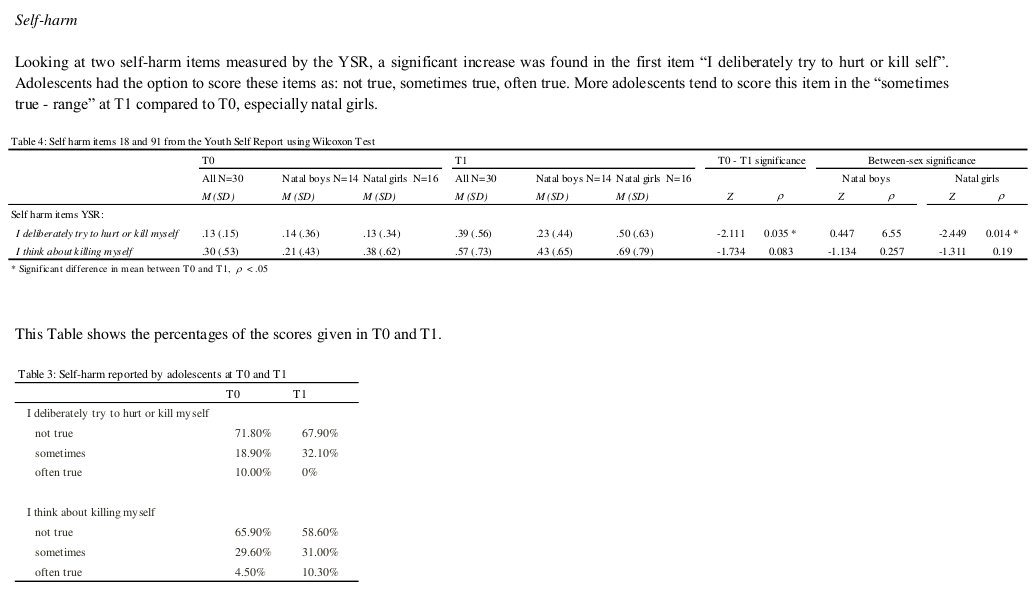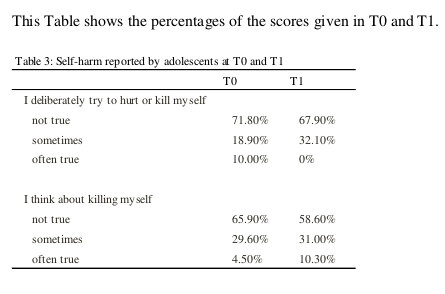
Simon Whitten@Simon_Whitten
Dec 12, 2020
64 tweets
For over a year two BBC Newsnight journalists have abused the trust placed in them by the public to spread undue fear and mistrust in clinical experts through biased, misleading and sometimes outright false claims.
This article is simply their latest effort.

BBC Newsnight@BBCNewsnight
Dec 11 20
View on Twitter
A study has shown all but one child treated for gender dysphoria with puberty-blocking drugs at a leading NHS clinic - The Tavistock and Portman Trust - also received cross-sex hormones.
READ MORE  #Newsnight | @Hannah Barnes | @Deborah Cohen cohen
bbc.in/37UvoZV
#Newsnight | @Hannah Barnes | @Deborah Cohen cohen
bbc.in/37UvoZV
 #Newsnight | @Hannah Barnes | @Deborah Cohen cohen
bbc.in/37UvoZV
#Newsnight | @Hannah Barnes | @Deborah Cohen cohen
bbc.in/37UvoZVThe campaign by @Hannah Barnes & @Deborah Cohen comprises four separate reports on the BBC Newsnight programme as well as multiple associated articles.
This thread will attempt to document the most obvious objections.
First, some brief background: The series of reports concerns transgender healthcare in the UK, especially the use of puberty blockers to delay puberty in adolescent and teenage trans folks.
Nobody is prescribe cross-sex hormones (CSH) on the NHS until 16+.
Although embracing this treatment brought NHS England in line with international standards, the practise has generated considerable opposition from the religious right and “gender critical” campaigners and has angered many an op-ed writer, even in the notionally liberal press.
In England and Wales everyone seeking puberty blockers through the NHS has to be referred to the Gender Identity Development Service (GIDS) run by the Tavistock and Portman NHS Trust.
This latest article references results of a study on participants in an early-intervention trial with puberty blockers.
The fact that most participants went on to seek CSH is presented as newsworthy and (when read in the context of prior reporting) potentially concerning.
The study had 44 participants who were the first youths in England and Wales to receive early-intervention with PBs on the NHS. Shortly after the trial started the treatment became available to non-participants. It has since ceased following the shameful Bell v Tavistock ruling.
According to Newsnight’s 1st report GIDS introduced the “controversial new treatment” on the basis of the “flawed” study and preliminary results showed an increase in self-harm with the implication that this may be caused by the use of PBs.
We are told that although these puberty blockers were sold as simply giving kids time to consider their options, GIDS withheld the fact that prior research had shown that 100% of kids on puberty blockers went on to seek cross-sex hormone therapy,
Notice the implication at the end there that the young people receiving blockers might otherwise have changed their minds had they not been receiving their treatment.
Anyone following the Bell ruling will recognise this dubious reasoning.
And we are told that so flawed was the study, due to the absence of a control group, and so severe the implications of the data thus far collected that the study itself is now under investigation by the Health Research Authority.
(This will be important later).
The supposed evidential basis for all three of these claims in the original Newsnight report is a package of documents obtained by Michael Biggs (he’ll come up later) through and FOI request.
Let’s examine the claims in turn:
First, @Deborah Cohen claims that among study participants those responding in the affirmative to the statement “I deliberately try to hurt or kill myself” increased (between T0: pre-trial interview and T1: one-year follow-up).
A claim repeated in this new article.
This is technically true but when this one stat is cherry-picked, removed from context and gets abbreviated “self-harm increased” it amounts to a lie by omission.
The claim is based on Table 4 in Appendix 7 of notes attached to the minutes of a meeting of the Trust board in June 2015 at which the head of GIDS presented a report.
A reference to the attached table will reveal that such an increase did occur, but. . .
. . .eagle-eyed readers will notice the more detailed breakdown in table 3.
It shows that the small shift from “never” to “sometimes” was accompanied by a much larger shift from “often” to “sometimes”.
Yes, by far the most significant result regarding self-harm in the data in question was a reduction in those saying they “often” try to hurt or kill themselves to zero after they started taking PBs.
This has never been reported by @Deborah Cohen despite her obsession.
To her credit @Deborah Cohen does admit that she can’t prove PBs were responsible for this “increase in self-harm” although she blames this on “flaws in the study’s design”, specifically the lack of a control group.
However the absence of a control group isn’t a “flaw” at all. It wasn’t overlooked. It wasn’t something that didn’t occur to the researchers. The study has no control group because one is impossible.
People tend to notice whether or not they’re going through puberty, so a randomised controlled trial is impossible in this instance. It would also be unethical.
This is the “parachute fallacy.” No one has done an RCT on parachute effectiveness. We can’t. We don’t need to.
Second, Cohen and Biggs note that previous research (“the Dutch study”) had found almost everyone prescribed PBs went on to seek CSH, with a suggestion that a causal role for PBs should be seriously entertained. The most recent article notes similar results at GIDS.
This inference is not present in the original study and is instead the invention of Biggs, an Oxford sociologist with no relevant expertise and a history of using sockpuppets to post anti-trans bile on social media.
oxfordstudent.com/2018/10/26/tra
Despite his lack of credentials, Biggs is given free rein to present his personal interpretations of the study without being challenged or corrected by either @Deborah Cohen or an opposing contributor with actual expertise.
It’s also worth considering that if the persistence rate were much lower then this would doubtless be taken as evidence that PBs were unnecessary in many cases.
They start with a conclusion and interpret evidence in a way to support it.
twitter.com/JolyonMaugham/

Jo Maugham@JolyonMaugham
Dec 12 20
View on Twitter
100% - 'children are making an irreversible choice'
50% - 'half of all children were wrongly prescribed puberty blockers'
0% - 'why are children needlessly being drugged'.
At some point you are logically forced to accept the BBC is transphobic.
I’ll leave a more complete discussion of the Dutch study and why the reinterpretation favoured by Cohen is implausible for the future. For now I’ll simply reiterate that this is a reading conjured up by a hobbyist with an obvious prejudice, and is not a conclusion of any study.
An interview given to BBC Women’s Hour reveals that yet again @Deborah Cohen cites the lack of evidence to support her position as though it somehow supports her position – attributed to “not well designed” studies.
twitter.com/SlauHaus/statu

The Slough House@SlauHaus
Dec 12 20
View on Twitter
Radio 4 Woman's Hour, 30th June 2020. An interview between 2 BBC journalists discussing the changed NHS guidelines on puberty blockers. There don't seem to be many alternative explanatory theories mentioned as to why most on blockers would go on to cross sex hormone treatment...
Thirdly, @Deborah Cohen stresses that the PB study is now under investigation by the HRA due to the concerning self-harm data and flawed design.
Again, this was technically true.
The twist is that @Hannah Barnes and @Deborah Cohen reported the study to the HRA themselves. The HRA was required to open an investigation because they’d received a report, which gave the Newsnight duo the shocking headline the desired.
Shortly after the HRA investigation reported that they found no wrongdoing on the part of GIDS or their associates and have the study a clean bill of health.
hra.nhs.uk/about-us/gover
Barnes and Cohen responded to the HRA report with an article on the BBC website not by acknowledging their alarmism had been misplaced but by insisting, with a link to an article in the British Medical Journal, that many had raised similar concerns.
bbc.com/news/health-50
Casual readers of the BBC article would come away with the impression that similar concerns had been raised by experts published in the BMJ.
But when we click through we find out this was a (non-reviewed) commissioned feature.
Written by @Deborah Cohen and @Hannah Barnes themselves.
Shockingly this isn’t even the gravest ethical violation associated with this article.
The only participant not hostile to PBs was a trans teenager who had attended GIDS. Her personally identifiable medical information (disclosed in an interview for Newsnight) was then published in the BMJ without her knowledge or consent. (She had to find out from me!!!)
Finally (for the first episode), it’s worth pausing to consider how the information is being presented.
Imagine you’re a journalist at a trusted national broadcaster with access to millions of viewers.
Imagine you have been approached by an activist with documents he claims raise red flags about a drug being prescribed to thousands of children in the UK. Activists and some concerned parents say that the drugs are putting the children’s well-being, and even lives at risk.
The NHS and the relevant international bodies all say that based on the balance of the evidence, the benefits of the drug likely outweigh the risks, which are being overblown, and there is an important place for the drugs as part of a broader clinical approach.
Your own experts tell you that the documents presented by the activist don’t support his conclusions, but don’t rule them out either.
How do you, as a trusted source with the potential to influence the way in which thousands of parents will make healthcare choices for their children, frame this story?
This could easily be a very boring news report. “Experts disagree over study protocol and implications of early results” isn’t the kind of framing that keeps bums on seats, nor is a lecture from experts on the subtleties of statistical inference and study design.
But a threat to your kids?
Kids being harmed by the very health service that’s supposed to be helping them?
Doctors failing to act?
And even attempting to bury the results of their own study?
Now that’s a sexy news story. A horror story even.
Appropriately enough, it seems the Newsnight studio was unavailable for filming, as they seem to have filmed on the set of a low-budget horror film.
Our narrator gives her monologue in a dark attic, sitting among eerily lit gender mannequins and discarded children’s toys.
Despite all this, a BBC spokesperson told Pink News that the film was “an impartial piece of journalism.”
. . . and like all good objective journalism, the mood was set with unsettling music.
pinknews.co.uk/2019/07/23/vie
Sensationalism limited to presentation would be one thing but, in an effort to dramatise their report, Newsnight misled viewers by repeatedly withholding important information that would undermine their narrative, while giving undue and uncritical exposure to fringe views.
Medical fearmongering really does have lasting consequences. It isn’t responsible, ethical or acceptable. Their alarmist tone alone should be grounds for censure.
Their second Newsnight report focused on detransition and transition regret.
They rely on personal testimony from one elderly detransitioner, an interview with a young woman who formed an advocacy group, and a clinician who supposedly has experience dealing with such clients.
Uniquely out of the four Newsnight episodes in question, this one also features testimony from a clinical expert and a advocacy group.
Perhaps the centre-piece of the report is Charlie Evans, founder of the “Detransition Advocacy Network”. A clip is played of Charlie at a rally saying “there are few studies behind detransition rates but I can tell you there are thousands of us.”. . .
. . . Cohen goes on to report that Evans claims to have been contacted by 300 people (the clear implication being that the 300 people are detransitioners). But little effort seems to have been made by the BBC to scrutinise Evans’ claims.
This is a problem since she recently admitted to dishonest recording practices.
twitter.com/DetransAdv/sta

The Detransition Advocacy Network (TDAN)@DetransAdv
Nov 21 20
View on Twitter
.. with fake emails as some kind of protest against the existence of our organization, remember that these emails must become part of our statistics. You are inflating the numbers of detrans people contacting us. This does not benefit anyone. 2/
And yet this is all the evidence they need to broadcast Evans unchallenged claiming that the detransitioners she’s spoken to wish they’d been opposed by clinicians when seeking treatment.
Cohen twice introduces Evans’ views with reference to her suppose attendance at a pride rally.
The implication being that she is unlikely to hold anti-LGBTQ prejudices.
But this is deeply misleading, she was attending the counter-protest called in opposition to the LGBTQ Pride event by a group called “Get The L Out UK” who explain on their website that “We strongly argue that the only way to end anti-lesbianism is to get the L out of the GBT”.
They go on to say “We stand against any kind of misogynistic politics and systems that prioritise men’s interests” and they go on to offer a list of examples which begins with “queer politics” and “transgenderism”.
The group focuses on organising protests against LGBTQ Pride events around the country, making headlines when they crashed the Pride event in London in 2018.
Newsnight even used clips from Get the L Out’s propaganda video as footage of the event.
When they marched in opposition to the Manchester pride event they handed out leaflets printed with the slogan “LGBT is misogyny”, leaflets which are clearly visible in most of the original footage and which must have been carefully edited around by the team at Newsnight.
The original video also opens with a series of title card explaining why they took this action, stating “We marched to oppose the medical transition of girls who don’t conform to sexist stereotypes”, and concludes by declaring that their action was dedicated to Magdalen Berns.
Despite all this, Cohen expressed Evans’ claim that young trans men are actually confused lesbians without any evidence and without telling viewers that a majority of young trans men are attracted to men.
(This is a popular meme among the various “gender critical” hate groups.)
Throughout the report detransition is conflated with a change in gender identity.
Most viewers would be left with the clear impression that detransitioners are cisgender people who used to think they were trans but no longer feel the same way. This isn’t the case.
In reality NHS data showsmost who detransition or experience transition regret do so because of the negative social response, with others doing so because of medical or surgical complications.
(p. 118)
epath.eu/wp-content/upl
Very few (2 out of 3398 NHS patients) did so because they determined that they were cisgender.
And this is reflected in the fact that rates of retransition are high – out of 13 who detransitioned, 10 later retransitioned.
Perhaps somebody should start a Retransition Advocacy Network?
The evidence supports it. But somehow I suspect @Deborah Cohen and @Hannah Barnes wouldn’t give you free PR.
In the same episode @Deborah Cohen interviews James Caspian, introducing him as a psychotherapist who has “worked with” transgender adults for more than a decade and who has now “spoken to dozens of detransitioners.”
We are told Caspian has spotted some “commonalities.” Namely, spending time on social media, being uncomfortable as a female and the perception that it’s “cool” to be transgender.
You may recognise these as tropes employed by advocates of the ROGD pseudo-diagnosis.
Caspian is another participant whose ideological commitments outweigh the value of his expertise. Caspian had written a number of articles expressing his hostile views on matters of trans healthcare but has failed to get any of them into peer-reviewed journals (a very low bar).
Missing some tweets in this thread? Or failed to load images or videos? You can try to .













